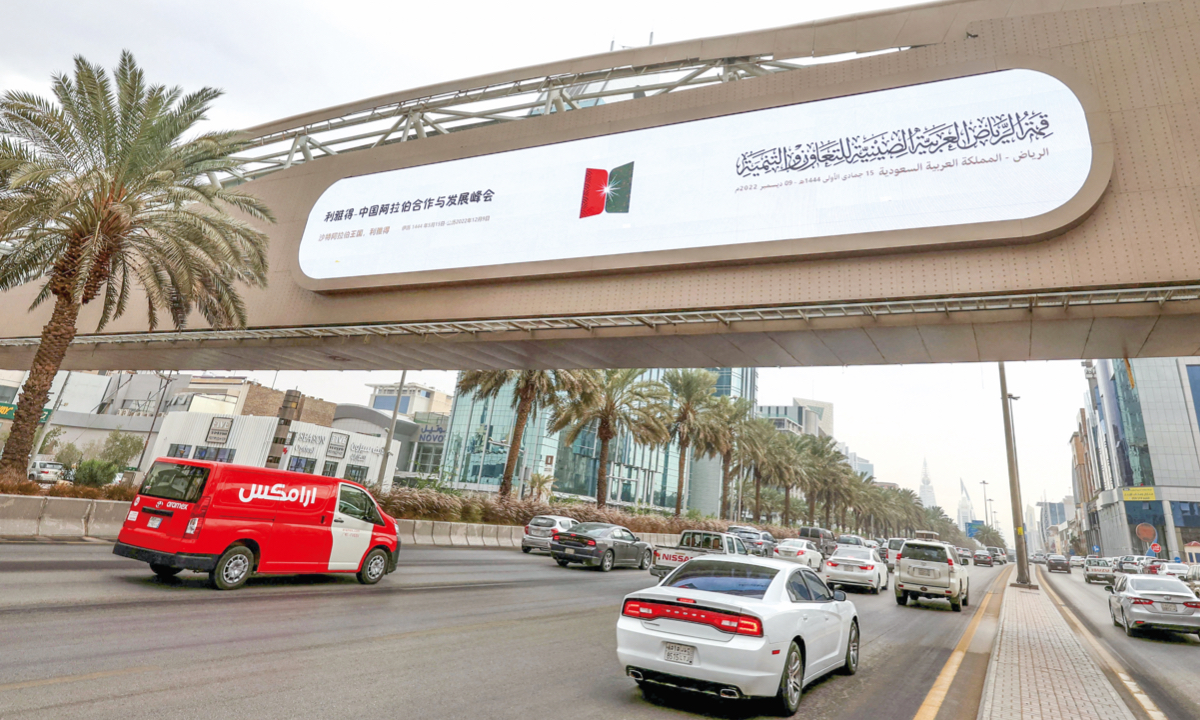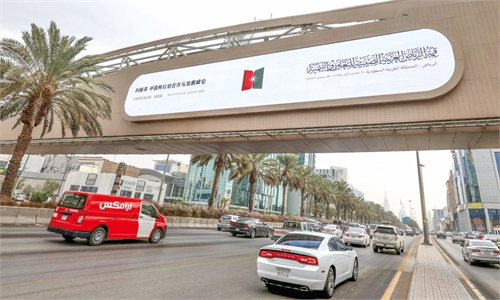Summits indicate depth of desire to strengthen ties between China and Arab states

A billboard for China-Arab States Summit is seen on December 7, 2022 in Riyadh, Saudi Arabia. Photo: VCG
Editor's Note:
With the holding of the first China-Arab States Summit and China-GCC Summit, the relationship between China and Arab countries has been substantively improved. How should we see the significance of Chinese President Xi Jinping's Saudi trip this time? What are its implications? Yahya Mahmoud bin Junaid (Junaid), chairman of the Riyadh-based Center for Research and Intercommunication Knowledge, shared his views with Global Times (GT) reporters Yu Jincui and Xing Xiaojing.
GT: In 2016, when President Xi visited Saudi Arabia, China-Saudi Arabia relations were upgraded to a comprehensive strategic partnership. How do you evaluate the cooperation between China and Saudi Arabia over the past six years? How do you interpret the importance of Xi's recent visit to bilateral relations?
Junaid: The relationship between China and Saudi Arabia is a vital strategic one that stems from mutual respect, non-interference in internal affairs, and mutual visits between the leaders of the two countries. This relationship confirms that the leaders of the two countries have a real desire to strengthen and advance relations. And perhaps one of the most important aspects of developing relations between the Kingdom and China is the keenness in teaching the Chinese language at all levels of education in the Kingdom, in addition to exchanging visits and attending seminars and conferences by specialists in both countries.
The visit of Chinese President Xi Jinping is very important, as it implies the depth of the desire to strengthen relations between China and the Kingdom.
GT: After the escalation of the Russia-Ukraine conflict, some Gulf countries including Saudi Arabia expressed positions different from that of Europe and the US. What are the implications of this trend?
Junaid: Saudi Arabia pursues a balanced policy that considers the interests of the Kingdom in the first place and tends towards achieving peace and progress for the world and avoiding wars. The Kingdom's attitude towards the Ukrainian war is a neutral one that has nothing to do with oil production, because oil is like other commodities that are put on the market and are subject to supply and demand, therefore it has no political aspect. Regarding the issue of human rights, there is no doubt that it is a complex issue that many countries exploit as a means of pressuring and maneuvering, because it is selective and turns a blind eye to obvious crimes, and focuses on matters of internal affairs, but it has nothing to do with the alleged rights whatsoever.
GT: What are the reasons for this closer cooperation between China and the China-Gulf Cooperation Council (GCC) countries? How do you view the prospect of a China-Arab community with a shared future?
Junaid: The Arab world views China as a loyal friend and effective proponent. There are many commonalities between the Arabs and the Chinese in customs and traditions. The presence of President Xi Jinping in Saudi Arabia, his participation in the China-GCC Summit, and China-Arab States Summit, besides his official visit to the Kingdom, are proof of the strength and solidity of the relationship between these countries and China. That also indicates respect and appreciation for China and its leadership in today's world, which is witnessing many changes. This visit will be a stepping stone to closer collaboration in order to boost international peace, establish equal relations between countries, based on mutual respect, non-interference in the internal affairs of any country, and enhance cultural existence.
GT: Some Western countries and media have hyped China as taking advantage of the US-Saudi row to expand its footprint and influence in the Middle East. What do you think of such claims in the West?
Junaid: Relations between states are governed by interests, especially economic ones. Hence, the Kingdom's relationship with China does not affect the Kingdom's relationship with the United States, which is a strategic partner. China is not aiming to replace any other country but looking to achieve mutual gains in its relations with the Arab countries and the Kingdom, and therefore it does not pose any threat or challenge to the United States. China has repeatedly declared frankly that it does not seek to be a substitute for others. Every country has the right to expand the sphere of its relations motivated by respect and mutual benefit.
GT: Next year will be the 10th anniversary of the Belt and Road Initiative. What role has the initiative played in China-Saudi Arabia cooperation? What does the initiative mean for Saudi Arabia's development?
Junaid: The Belt and Road Initiative, which was established by the Chinese, is a return to the depth of history, as China has been linked, materially and morally, to the Arab world through this road over hundreds of years. There is great evidence for this represented in trade and exchange of knowledge. This initiative, in its contemporary form, is beneficial to all countries through which this Road passes, including the Kingdom, and it is the initiative that the Kingdom considers a means to benefit from Chinese expertise in the field of industries in particular. It is hoped that this initiative will result in a closer people-to-people relationship between the Saudi and Chinese peoples.
GT: You said that the world should learn more about China and understand China better. Some Western countries regard China's rise and success as a threat. Will such rhetoric affect Arab countries' views on China?
Junaid: China strives to build itself, shares its knowledge with the countries of the world, and provides aid to many countries. Most importantly, it does not interfere in the affairs of others and does not impose its values and traditions; therefore, it is welcomed in Arab countries.
GT: You often visit China. Can you share what has impressed you the most about China's development in the past 10 years? And why do you think China has been able to achieve this development success?
Junaid: I have visited China three times and toured Beijing, Shanghai, Xi'an, Guangzhou, Hong Kong, and Macau. I have witnessed rapid strides in development in various fields. This confirms that China is proceeding according to a careful development program that covers infrastructure, advanced industries, and poverty uprooting. There is no doubt that China has achieved splendid success in its progress, and the clearest evidence of that is its space program, as it is the second country to reach Mars. Also, China is the first country to reach the dark part of the moon, and this progress was achieved by virtue of education and scientific research.
GT: The report to the 20th National Congress of the CPC emphasized that Chinese modernization offers humanity a new choice for achieving modernization. China hopes that every country can find a path to modernization that suits its own culture and national conditions. How will China's exploration of Chinese modernization inspire Middle Eastern countries?
Junaid: China's attitude toward human progress according to the circumstances of every country in the world reflects Chinese wisdom and the striving for human progress without interference in other countries' affairs. This rational choice is considered an inspirational source for Middle Eastern countries because it focuses on seeking to choose the appropriate path of modernization without imposing ideas that do not fit with societies and does not invade their privacy.

